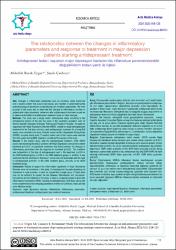| dc.description.abstract | Aim: Changes in inflammatory parameters such as cytokines, stress hormones
and C reactive protein that occur in depression, are important in understanding the
pathophysiology of depression and developing new treatment approaches. The main
purpose of this study was to determine the changes in inflammatory markers in
patients with major depression, before and after antidepressant treatment, as well as
to determine the effect of antidepressant treatment types on these changes.
Methods: This study was a single center, retrospective study. According to the
retrospective records of the last five years in the psychiatry outpatient clinic of
Alanya Alaaddin Keykubat University Training and Research Hospital, the patients
diagnosed with Major Depressive Disorder (MDD), started on single antidepressant
treatment for the first time and who used antidepressant treatment for at least 6-8
weeks, were included in the study. Patients whose Hamilton Depression Rating Scale
(HDRS), complete blood count, C reactive protein and cortisol values were reached
from the system during MDD treatment, constituted the sample of the study.
Results: In the present study, after the antidepressant treatment, while HDRS
scores decreased significantly in patients with Major Depression compared to before
treatment (p<0,001), no significant correlation was found between the changes in
inflammatory parameters and the response to treatment (p>0,05). This condition
was independent of the type of antidepressant used in the treatment (p>0,05 in
the SSRI treatment group, p>0,05 in the SNRI treatment group). In addition, it was
observed that the decrease in depression scores was not associated with the type
of antidepressant (p=0,001, in the SSRI treatment group, p=0,005, in the SNRI
treatment group).
Conclusion: Results to support the inflammatory hypothesis in Major Depressive
Disorder were not conclusive in this study. Considering that the pathophysiology of
depression is quite complex, it could be argued that a single group of blood tests
may not be sufficient to explain the link between inflammation and depression.
Considering all the limitations of the study, a future a prospective study to prove the
inflammatory hypothesis in MDD, including the detailed blood, BOS tests, along with
more comprehensive neuroimaging parameters on the brain pathways, might provide
more effective results | en_US |


















